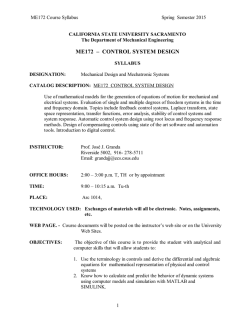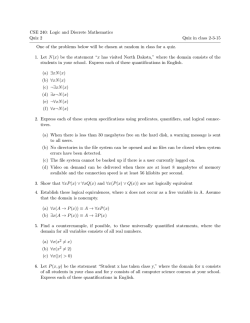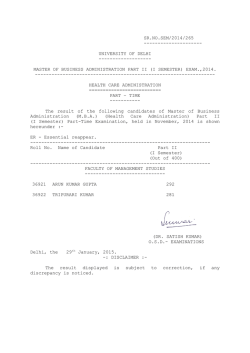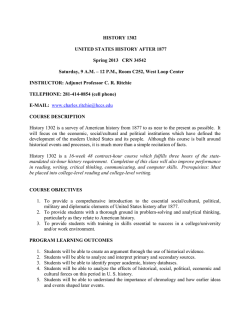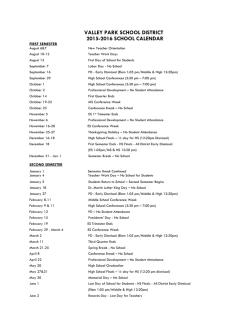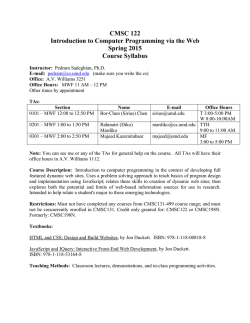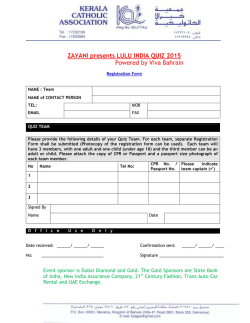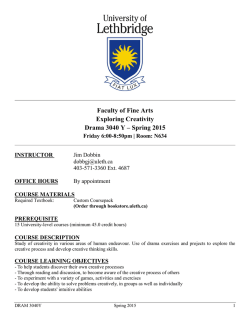
ECO 202 601 - Red Rocks Community College
Course Syllabus Principles of Microeconomics Econ 202 Section 601 (CRN # 32352) Spring 2015 Welcome to Microeconomics at Red Rocks! Best Wishes for an Exciting and Successful Semester. COURSE DESCRIPTION: I n this course, In this course we will study microeconomics which is the study of the behavior and decisions of consumers and business firms and their relationship to the economy as a whole. In this context, we will study the characteristics of elasticity, consumer and producer surplus, marginal decisions, and profit maximizing conditions as they relate to various types of costs. In addition, we will discuss the role of governmental policies including taxes and their impacts on the microeconomic models. PLEASE NOTE: This is an paced course. an entire 16 weeks of material in 6 class days (3 weekends). In addition to the time you are in class, you need to devote a significant portion of your time outside of class to completing course readings, reviewing material covered during class and studying. You should evaluate your other responsibilities with respect to school, work and family to ensure you have the time available to commit to this class, this semester. Moreover, to facilitate your academic success, it is very important that you do not miss classes. Missing a day of this class is like missing several weeks of a traditional semester course. 1 We will cover CONTACT INFORMATION: CLASS LOCATION: East Building 2301 LECTURES: F: 5:00 PM – 10:00 PM S: 8:00 AM – 5:30 PM February 27, 2015 – March 14, 2015 CREDIT HOURS: 3 credit hours INSTRUCTOR: Carol Martin OFFICE LOCATION: 1654 OFFICE HOURS: MW: 10:30 AM – 1:00 PM F: 3:45 PM – 4:45 PM EMAIL: [email protected] Please notify me via email by 8:00 PM on Thursday that you need to utilize my Friday office hour. I will be in the office during the Friday office hour for established appointments. EMAIL MESSAGES TO ETHE ADDRESS ABOVE AND NOTSEND THROUGH D2L mail is my preferred method of contact. Emails sent through D2L are not forwarded to my college email address, which will result in a response being delayed. In addition, you must use your student email account. Please feel free to email me regarding any questions related to the course. Please identify a subject for your email on the subject line as well as the class and section in which you are enrolled. If I don’t respond to your email within 24 hours, please assume that I did not receive it and resend your message. Please note: I do not check email on Saturday or Sunday. SYLLABUS ACKNOWLEDGEMENT: T his syllabus is provided to give you a complete outline and explanation of the course content, requirements, grading and expectations. It is important that you read it thoroughly and completely understand its contents. If there is a question regarding the syllabus – please ask! In addition, as part of your graded work, using the D2L discussion forum, you will write a brief statement of acknowledgement indicating that you have read and understand the terms of the syllabus, the course expectations and grading. This must be completed, on or before, the course drop deadline of February 28, 2015 at 11:59 PM. COURSE PREREQUISITES: W hile there are no specific college course pre-requisites, you will need the ability to read at an 11th grade level and have a basic understanding of high school level algebra including graphing using the coordinate plane. A review of these topics can be found in the appendix of Chapter 2. 2 COURSE INFORMATION GENERAL INFORMATION: COURSE ANNOUNCEMENTS: You will need to check the news section of D2L, found on the home page for the class, on a regular basis for important course announcements. If the instructor has to cancel class for any reason, notice will be posted in the news section of D2L as early in the day as possible. You are responsible for knowing all information and announcements posted for the course and any syllabus amendments discussed in class. STUDENT E-MAIL: All students enrolled in Red Rocks Community College are assigned a college email account, and this email account is the college’s primary means of communication with students. You can get directions to your E-mail through the registration system (The Rock). IMPORTANT COLLEGE DATES: CENSUS DATES: DROP DEADLINE: February 28, 2015 (full refund) WITHDRAW DEADLINE: March 10, 2015 (no refund) The drop deadline is the deadline to drop the course and receive a full refund. The withdraw deadline is the last day to withdraw from the class but you will not receive a refund and you will receive a W for the course on your transcript. Please note that failing to drop or withdraw from a class that you do not attend WILL result in a grade of F for the course and WILL be included in your academic records and/or transcripts. In addition, receiving a grade of F may have negative consequences for a student’s ability to receive financial aid in a future semester. You should check with academic advising regarding your particular circumstances to determine the effects of either a grade of W or F in this course on your ability to receive financial aid for future semesters. GRADUATION AND CERTIFICATE: If you are graduating or completing a certificate program this semester, you must apply for graduation on or before February 4, 2015. You can apply online (RRCC website, A-Z Index “Graduation Application”), or you can come to the Student Records office to fill out an application. It is also important that you make sure the college has your correct mailing address as diplomas and certificates will be mailed in early June. In addition, Red Rocks can only contact you through your RRCC STUDENT email account. The college can no longer use personal email addresses. 3 TRANSFERRABILITY OF ECONOMICS 202: This course is fully transferable to colleges and universities throughout the country. It fulfills the degree requirements for the A.A.S. degree in Management and Accounting. It also meets the GEM course requirements for general education and applies towards graduation as a Social Science elective for the A.A., A.S. and A.G.S. Degrees. Students desiring a B.A. degree in Business, Economics, Accounting, Engineering or Public Administration will find that this course meets the requirements for that degree also. INFORMATION FOR CONCURRENTLY ENROLLED STUDENTS: All of the faculty and staff at Red Rocks Community College are pleased that you are beginning your college experience here and that you are part of our student community. Your high school may require your instructor to sign forms verifying your attendance during your high school’s enrollment count period. It is very important that you bring the attendance forms to class on each day that you need your attendance verified so your instructor can sign them. These forms are important for your high school to receive the state and federal funding they are entitled to because you are one of their students. However, your instructor will not sign an attendance form attesting to your attendance on any day you were not in class or any day your instructor cannot verify via her own records that you were in class. Therefore, to ensure that your high school receives their information in a timely manner, please provide the attendance form needed each class period. ACCOMMODATION: ADAAA (Americans with Disabilities Act Amendments Act of 2008) and Section 504 of the Rehabilitation Act of 1973: Red Rocks Community College is committed to access for students with disabilities. If you are a student with a disability and need assistance or are interested in requesting accommodations, please Accessibility Services. Faculty are not obligated to provide accommodations without proper notification by Accessibility Services and accommodations are not retroactive. Students may contact the Access staff by telephone or email to make an intake appointment at 303-914-6733 or [email protected]. Accessibility Services is located in Suite 1182 at the Lakewood campus. More information is available at www.rrcc.edu/accessibility-services. TUTORING AND STUDENT SUCCSESS SERVICES: All Red Rocks Community College students have access to a variety of services and resources designed to facilitate your success as a student. This includes walk-in tutoring services that are free of charge. Tutoring for a variety of subjects including math, sciences, accounting, writing, foreign languages and other courses is available in the Lakewood Learning Commons, unless otherwise noted in the tutoring schedule. For further information about times and availability of tutoring services, contact the Lakewood Learning Commons at 303.914.6705. 4 In addition to tutoring services, the college offers a variety of other resources to facilitate your ability to be a successful student. The Connect to Success office offers resources and materials on topics including goal setting, time management, note taking and study skills, test taking skills and managing testing anxiety among others. These resources are offered free of charge to current students. For more information, visit http://www.rrcc.edu/connect-tosuccess. SCHOLARSHIP OPPORTUNITIES FOR RED ROCKS COMMUNITY COLLEGE STUDENTS: More than 200 scholarship awards are available based on a combination of merit and financial need in the Red Rocks Foundation Scholarship Program. Since 1991 over $4.4 million has be awarded to deserving RRCC Students for over 3,900 scholarships. Applications are available starting in January 20, 2015. The deadline for completed applications is May 29, 2015 at 5:00 PM. During the semester, there will be a variety of workshops to assist students with respect to preparing their most effective application package. For additional information and qualification guidelines, please review the Foundation Scholarship Program informational flyer in the Course Information Section found under the Content tab of D2L for the course. For additional information contact: Red Rocks Community College Foundation Phone: 303.914.6426 Email: [email protected] http://www.rrcc.edu/foundation/scholarship-programs CLASS CANCELLATIONS: Class may be cancelled or delayed due to inclement weather by the college or the instructor as needed. Given weather conditions, students are advised to monitor local news in the event the college is closed due to weather. Please monitor D2L as instructor cancellations for any reason will be posted in the news section, of the course home page, in D2L. In addition, students may register through Red Rocks or at TheDenverChannel.com website to receive closure alerts via text message if the college campus is closed due to weather. EMERGENCY PROCEDURES: The fire exits and emergency procedures will be discussed during the first class. When the fire alarm sounds, all students are expected to exit the building immediately. Since the security of items left behind is not guaranteed, students should gather all personal belongings before proceeding to the nearest exit. 5 DIVERSITY AND EQUAL OPPORTUNITY: Red Rocks Community College is committed to diversity in its people and programs. The College is an equal opportunity educational institution and does not discriminate on the basis of disability, race, creed, color, gender, sexual orientation, gender expression, religion, age, national origin, or ancestry, or any other category protected by applicable law. The College has designated the Human Resources Director as its Equal Opportunity Employment Officer and Title IX Administrator with the responsibility to coordinate its civil rights compliance activities and grievance procedures. Report all concerns or complaints relating to discrimination or harassment to the Title IX/EO Coordinator(s): Bill Dial, Director of Human Resources/Title IX Administrator, 13300 West Sixth Avenue, Lakewood, CO 80228. 303.914.6298. [email protected] REQUIRED MATERIALS: REQUIRED TEXT: Paul Krugman and Robyn Wells, Microeconomics Third Edition, Worth Publishers (ISBN: 9781429283427) Students are responsible for obtaining the text and any materials required for this course. Not having a textbook or any other materials required will not be given any special consideration as far as the student’s inability to complete any course requirements including reading assignments. NOTE: THERE IS A COPY OF THE TEXTBOOK ON RESERVE IN THE CAMPUS LIBRARY FOR YOUR USE. OPTIONAL TEXT: Paul Krugman and Robyn Wells, Study Guide for Microeconomics, Worth Publishers. The study guide is optional but it is a useful source of practice problems and questions. ADDITIONAL MATERIALS: In addition to your typical class items, please bring a standard calculator daily which will be useful for solving class problems. PLEASE NOTE: CELL PHONE CALCULATORS AND IPADS WILL NOT BE ALLOWED FOR ANY EXAM. 6 INTERNET ACCESS AND D2L: Since your grades, course news, final exam and other materials are posted to the course website on D2L, is important that you have access to a computer and the internet on a regular and consistent basis throughout the semester. In addition to any internet access you may have at home, there are many computers available on campus that you can use to access the internet. Many public libraries also offer free internet access. It is important that you clearly identify any limitations you may have to participate in course activities and determine an appropriate solution so that you may be successful in this course. Please note: If you are not familiar or comfortable with the functionality of D2L, you are encouraged to participate in one of many tutorials available. Further information can be found at www.rrcc.edu/online. If you have any technical issues with D2L, you may contact the help desk which is available 24 hours a day. Other helpful links are provided above for your use. You should also note any D2L scheduled maintenance to ensure that you have completed tasks requiring D2L prior to any D2L outage for maintenance and/or note any alterations to assignment due dates and/or times. OPTIONAL ONLINE MATERIALS: You will find a variety of video lecture links in the content section for many of the course topics. These online lecture resources are provided to give each student the opportunity to experience the material in another format. Some of these lectures are based upon the textbook used in this course. Those are identified by (Krugman) after the title. You can watch any of them for free. You are not required to view them but I hope you will find them helpful in your studies. Generally, they are approximately 10 – 15 minutes in length. You will also find practice quizzes, in the quizzes section of D2L, for each chapter covered in the course. You may take these practice quizzes as many times as you like. They are provided to give you an indication of the type of questions you could see in the exams. In addition, the PowerPoint slides for the textbook chapters covered in this course, are included in the content section of D2L. 7 STUDENT OUTCOMES AND COURSE GRADING COURSE GOALS: I n this course, students will have the opportunity to examine the operation of the micro economy. In this context, students will: 1. Explain and interpret the effects of a variety of events on supply and demand curves and the resulting effect on equilibrium price and quantity 2. Learn how calculate and interpret comparative and absolute advantage 3. Graphically and verbally interpret the effects of a variety of government policies that restrict the price or quantity of goods transacted in the market place. 4. Calculate and interpret price elasticity of demand, cross price elasticity of demand, income elasticity of demand, and the price elasticity of supply 5. Evaluate the effects of taxation policies 6. Evaluate and explain optimal consumption decisions given a budget constraint 7. Explain and calculate production costs and the optimal output levels under perfect competition, and monopoly. STUDENT COMPENTENCIES: P er the Colorado Community College System, after successfully completing this course students will be able to: 1. Demonstrate awareness of economic concepts of: the consumer, the firm, the nature of cost, perfect competition, monopoly, oligopoly, and monopolistic competition. 2. Show understanding of the fundamental significance of the resource base, demographic change, positive and negative externalities, income distribution, social welfare, discrimination and economic waste. 3. Manifest the ability to recognize, collect and analyze objective performance data employing the scientific method. Further, understand and use models that project possible economic outcomes. 8 4. Demonstrate the ability to select and apply contemporary forms of technology to solve problems or compile information. 5. Read, analyze and apply written materials to new situations. 6. Write and speak clearly and logically in presentations and essays GRADING: Y our grade in this course will be the result of your performance on a combination of in class activities and exams with each category counting toward your final grade according to the following percentages: Class Participation Chapter Quizzes Final Exam 30% 40% 30% Your final grade will be calculated according to the following grading schedule as a percentage of the total points possible given the weighted percentages above. In the event that a student’s final grade is borderline between grades at the end of the semester, the instructor will evaluate overall performance, improvement and attendance with respect to in class assignments and exams. Please note that borderline between grades means a final percentage grade within 1% of the next higher grade (e.g. a student with who has regular and consistent in class problem submissions AND whose final grade is within 1% of the next higher grade such as 79.5% could be eligible to receive the next higher grade of 80%. Such adjustments are entirely at the instructor’s discretion. PLEASE NOTE: a student with a borderline grade who has less than a 90% for their class participation grade WILL NOT be eligible for the higher grade if the final grade percentage falls within the borderline percentage. In addition, students can only receive a maximum of 100% of any grading category. Score Grade 90% - 100% 80% - 89% 70% - 79% 60% - 69% Below 60% A B C D F 9 Student grades will be posted on D2L throughout the semester. The instructor makes no guarantees as to when exactly any particular item will be graded or posted into D2L. However, the instructor will make all practical efforts to grade items as soon as possible. Students should monitor their progress as the course progresses. In addition, while all efforts are made to ensure that grades are recorded accurately, it is the student’s responsibility to monitor their grades and notify the instructor of any discrepancy, if one should occur. CLASS PARTICIPATION: Throughout the semester, students will solve, either individually and/or in groups, a PRINCIP LES OF variety of problems and/or complete activities designed to MICRO ECONO teach course concepts. These problems and activities MICS ECONO will be completed during regular class time and/or may be MICS 2 02 SECTIO assigned to be completed as homework and discussed Stu Nam e N 007 dent 1 during a subsequent class. Students will receive points Student Signatu 2 re Student 3 for being present, working on, and completing these Student 4 problems and/or activities. Students signing the Student 5 Student participation sign-in sheet, when it is presented, will be 6 Student 7 awarded the points for that activity. In addition, Student 8 Student attendance may be a class participation activity at the 9 instructor’s discretion. To receive credit, students SStutuddent 10 ent 11 must sign a participation sign-in sheet for each Student 12 activity. If a student does not sign the participation SStudent 13 tudent 1 4 sign-in sheet, he/she will not receive credit for that Student 15 Student participation activity. It is each student’s 16 responsibility to ensure they have signed each participation sign-in sheet to receive credit. Students who are absent during those activities when the participation sign-in sheet is presented will not receive class participation points for those assignments. If you are absent on a day when a class participation assignment was completed during class or assigned as homework, you are still responsible for understanding the problem solving methodology and content presented. There are no make-ups for missed class participation exercises or attendance. CHAPTER QUIZZES: Multiple choice chapter quizzes will be given during class on the dates identified in the schedule below. The two lowest of these quiz scores will be dropped. There will be NO quiz make-ups and no one will be allowed to take the quizzes on another day, or at another time, for any reason. Please note the quiz dates that are in the syllabus and plan your work and personal schedule (eg. holiday trips etc.) around these dates. If you are absent during a quiz, for any reason, you WILL receive a zero on that quiz. Students are responsible for knowing all material presented in class and within the reading for testing purposes. To prepare for quizzes, it is recommended that you review lecture notes, textbook materials, and in class problems. 10 FINAL EXAM: There will be a multiple choice, comprehensive, online final exam which will be completed in the quiz section of D2L. The final exam will be available from 3:00 PM Saturday, March 14, 2015 through 11:59 PM Sunday, March 15, 2015. You must complete the exam in one sitting once you begin the exam. That is to say, once you begin the exam, you must complete the exam. The time allotted to complete the exam, once you have begun, will be noted in the quiz section of D2L. There will be NO exam make-ups. Therefore, don’t schedule airline flights or anything else during the final exam time. In addition, if you are struck by lightning on the morning of the final or some other catastrophic event happens to you personally right before the final exam, you must provide written documentation from a physician or other official documentation (eg. a police accident report), on their office letterhead, that can be verified. An accommodation will only be considered for those circumstances in which written documentation that can be verified. If you don’t have written documentation or your documentation cannot be verified directly with the physician etc., you will receive a zero on the final exam. In addition, since technological glitches can occur, it is not recommended that you wait until the final hours the exam is available to take the exam. Students are responsible for knowing all material presented in the PowerPoints and the reading for testing purposes unless stated otherwise by your instructor. To prepare for exams, it is recommended that you review the PowerPoints, textbook materials, and homework problems. You can also take short practice quizzes for each chapter covered this semester. The practice quizzes can be accessed through the content section for each unit and in the quiz section of D2L. They are only intended to provide some examples of the wording of possible questions. You may take these practice quizzes as many times as you wish. READING: With the exception of the first day of class, it is EXPECTED that you will have completed the lecture reading prior to lectures on the material. In addition to the text, I may assign relevant articles which highlight a topic being covered in the text and/or lecture. Electronic copies of these articles or web links for these materials will be provided on D2L in the news and/or content section as PDF files or web links. IN-CLASS VIDEO CLIPS: Throughout the semester, the instructor will introduce current news, interviews, current economic statistics and course content via video clips and/or documentaries from a variety of video media sources. It is expected that students will take notes on this content and the ideas presented in this material as this material may be a source of testing questions. Please consider this material as important as class lecture. Therefore, when the material is being shown, it is not time to check your email, surf the web or any other nonclass related activity. 11 EXTRA CREDIT: Extra credit questions and/or assignments may or may not be periodically provided on the exams or in some other format during the semester. You should think of extra credit points as the sprinkles on the cupcake. The amount and point values will be determined at the instructor’s discretion. Completion of the extra credit is entirely at the student’s discretion and the student SHOULD NOT rely on extra credit. In addition, the determination as to which grading component extra credit will apply is at the instructor’s sole discretion. Moreover, extra credit will not allow a grade category to exceed its defined percentage of the total grade. MAKE-UP WORK: No make-up opportunities for class participation assignments, quizzes or exams will be given. Part of your learning this semester is preparing yourself to complete your work on time, completely and accurately, given unexpected circumstances as is expected in the employment world. INCOMPLETES: A grade of "I" indicates that the course objectives are not yet fulfilled. The ”Incomplete” grade is a temporary grade and is designed for students who, because of documented illness or circumstances beyond their control, are unable to complete their coursework within the semester, but have completed at least 75% of all course assignments and tests in a satisfactory manner with a grade of ”C” or better. It is the responsibility of the student to request a grade of incomplete from the instructor. The instructor's decision to authorize an incomplete grade is final. It is the students’ responsibility to familiarize themselves with RRCC policy and deadlines, and make arrangements accordingly. SYLLABUS AMENDMENTS: The instructor reserves the right to make amendments to the present syllabus at any time, at the instructor’s discretion. Students will be notified of changes in a timely and reasonable manner. Changes will be announced in class, as a news announcement on the class home page on D2L and/or via email. It is students’ responsibility to inquire of any possible additions should a student miss class. EXPECTATIONS FOR OUR CLASSROOM STUDENT CLASSROOM ETIQUETTE: E very student is expected to conduct themselves in a collegiate manner which helps create a positive learning environment for themselves and the other students in the class. As such, it is expected that students will ARRIVE ON TIME and stay for the duration of the class period, actively listen to the lecture and participate in discussions, speak to and with other students and the instructor in a respectful tone of voice, using appropriate language, and respect the opinions of others. In addition, please do not prepare to leave class – packing and zipping backpacks etc. until the lecture and discussions are completed. If, due to extenuating circumstances, you must either arrive late or leave early, it is expected that you will do so in a quiet and inconspicuous manner so as not to distract or disturb other students or the instructor. 12 ATTENDANCE: Regular attendance is expected. College learning is not a spectator sport and you need to be present to listen to and add to the learning experience for yourself and your classmates. Problems will be given during the semester and students will receive participation points for completing those assignments during class. No make-up assignments will be given. CLASS PERIOD BREAKS: Students will be given breaks throughout the class so that you may return phone calls, get a snack or beverage etc. Please note that there are restrooms nearby. In addition, there are snack and beverage vending machines throughout the campus as well as a coffee shop adjacent to the bookstore and a café on campus. Given the course meets during normal meal times, you may bring food, drinks and snacks into the classroom. However, please be considerate of your classmates with respect to rattling packaging, crunching and excessively odiferous food choices. In addition, please dispose of packaging and leave your seating area clean when you are finished. TAKE RESPONSIBILITY AND BE ACCOUNTABLE FOR YOUR OWN EDUCATION: You are ultimately responsible for what you learn in this class. You must take responsibility for being prepared for class, attending class, being attentive during class, asking questions if you need help with the material, and studying the material outside of class. It is a “general rule” that you need to spend 2 – 3 hours outside of class for every hour in class. It may be necessary to spend even more time to adequately learn the material and complete assignments etc. Please evaluate your course load, the number of hours you work, and other family or personal responsibilities to make sure you have adequate time for this course. Everyone learns differently and has different skills but as basketball coach Taras Brown once said, 13 CELL PHONES ETC: Please make sure your cell phones and other electronic gizmos, are turned off. Note that this does not apply to laptop or tablet computers. However, using a laptop or tablet computer during class to work on assignments for other courses, surfing the internet, working on social networking websites, or checking and sending emails is NOT appropriate classroom behavior. Engaging in these activities is not only a distraction to you, but it is distracting to your instructor and is also disruptive to your classmates and impacts their learning in a negative manner. PLEASE NOTE: IF A STUDENT IS TEXTING DURING CLASS OR OTHERWISE USING THEIR TECHNOLOGY DURING CLASS IN AN INAPPROPRIATE WAY, HE/SHE WILL BE ASKED TO PUT THEIR PHONE OR OTHER ELECTRONICS EITHER IN THEIR BACKPACK OR ON THE INSTRUCTOR’S TABLE AT THE FRONT OF THE CLASSROOM. STUDENT DISCUSSION ETIQUETTE: TOLERANCE OF AND RESPECT FOR DIFFERING VIEWPOINTS: The study of economics will involve topics that may be viewed from a variety of political/philosophical perspectives. Such discussions are intended to highlight the relevance of the course material and explain course content with respect to current day events. As such, course discussions may involve topics and viewpoints that are different from your own and may be controversial. Everyone is encouraged to participate in these discussions. However, it is important that you filter your comments and questions to make sure that they are polite, appropriate, and relevant to the discussion in progress. In no way are you obligated to believe in one political viewpoint over another. Grading is in no way contingent upon having any particular political/philosophical viewpoint. However, everyone is expected to examine alternative views and their sources and to be respectful of everyone presenting their views. 14 INSTRUCTIONAL POLICY ON ACADEMIC DISHONESTY PLAGIARISM AND CHEATING: A cademic dishonesty includes cheating and plagiarism. Cheating is the unauthorized use of assistance with intent to deceive an instructor or any other individual responsible for evaluating a student’s work. Note the following examples: Submission of any materials not prepared by students but presented as their own. The unauthorized possession and/or use of notes, books, or the soliciting of assistance from another student during an examination. Illegitimate possession or disposition of examination or test materials and/or answer keys to tests and examinations. Plagiarism refers to the use of another person’s work without giving proper credit to that person. A student must give proper credit through the use of appropriate citation format when (a) copying verbatim another person’s work (i.e., words, phrases, sentences, or entire passages); (b) paraphrasing another person’s work (i.e., borrowing but rewording that person’s facts, opinions, or ideas); and (c) summarizing another’s work (i.e., use of one’s own words to condense longer passages into a sentence or two). CONSEQUENCES OF ACADEMIC DISHONESTY: When dishonesty is evident, the following minimum sanctions will be applied: First offense: The student will receive an “F” or “Zero” as the grade for the assignment. In addition, the first incident may result in the loss of testing privileges in the Learning Resource Center for the current and next semester in which the student is enrolled in the college. Second offense: The student may receive an “F” for the course and may be expelled from the class. A second offense may also result in permanent loss of testing privileges in the Learning Resource Center. 15 Tentative Lecture Schedule: T he schedule below is merely the anticipated dates that I am planning to begin discussing the material identified. It is subject to change. Dates February 27 February 28 February 28: March 6: March 7: March 10: March 13: March 14: March 14 - 15: Reading and Lecture Topic Chapter 1: First Principles Chapter 2: Economic Models: Tradeoffs and Trade LAST DAY TO DROP COURSE WITH FULL REFUND Chapter 3: Supply and Demand Chapter 4: Consumer and Producer Surplus Chapter 5: Price Controls and Quotas: Meddling with Markets Quiz 1: Chapter 1 Quiz 2: Chapter 2 Chapter 6: Elasticity Chapter 7: Taxes Quiz 3: Chapter 3 Quiz 4: Chapter 4 Chapter 9: Decision Making by Individuals and Firms Chapter 10: The Rational Consumer Quiz 5: Chapter 5 Quiz 6: Chapter 6 LAST DAY TO WITHDRAW FROM THE COURSE Chapter 11: Behind the Supply Curve: Inputs and Costs Chapter 12: Perfect Competition and the Supply Curve Quiz 7: Chapter 7 Quiz 8: Chapter 9 Quiz 9: Chapter 10 Chapter 13: Monopoly Chapter 18: The Economics of the Welfare State Quiz 10: Chapter 11 Quiz 11: Chapter 12 Final Exam: Chapters 1 - 7, 9 - 13, and 18 16
© Copyright 2026
